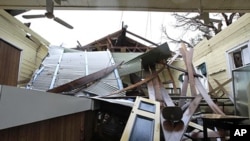A category five cyclone and flooding that affected 70 percent of Queensland and vast areas of agricultural land in the southern state of Victoria have hit the Australian economy hard.
Australian treasurer Wayne Swan has warned that recent floods and storms will damage economic growth. For Australia’s Asian neighbors, the disasters are likely to mean more expensive coal and food.
The repair bill after a summer of natural disasters will hit billions of dollars, including the cost of repairing vital infrastructure, such as roads, railways and bridges.
And while Australians are trying to rebuild, they have less to export overseas - the disaster shut down coal mines and destroyed millions of dollars worth of crops.
The Australian Bureau of Agricultural and Resource Economics and Sciences estimates that $2.5 billion in coal production has been lost, while floods in eastern Australia cost farmers at least $600 million because of damage to fruit, vegetable, cotton and grain crops.
The government warns that economic growth in the first quarter of 2011 is likely to go into reverse as a result.
Swan says the true cost to the country will only emerge in time.
"Well, we'll have to take our time to get an accurate estimate. I've been in north Queensland and far north Queensland. I've seen the damage in places like Tully and Mission Beach. It is extraordinary so we've got to take our time. Well, certainly it is going to be a lot of money," he said. "It is not just the damage to the towns. Of course it is the damage to the critical infrastructure and of course, it is the damage to some of those critical primary industries as well."
For Asian markets that depend on Australian exports, prices for many foods and for coal are expected to rise. There have been some forecasts in China that coal prices this year could go up 50 percent, at least temporarily, because of damage to Australian mines.
With the World Food Program reporting that food prices this year have reached record levels, there are concerns in many countries that poor crops in Australia will make the situation worse.
However, the Australian economy itself may be able to withstand the shocks. The powerful mineral resources sector in the country’s west has so far been spared the long string of disasters that struck the east.
Economists and business leaders say as a result, any affect on growth is likely to be temporary.




